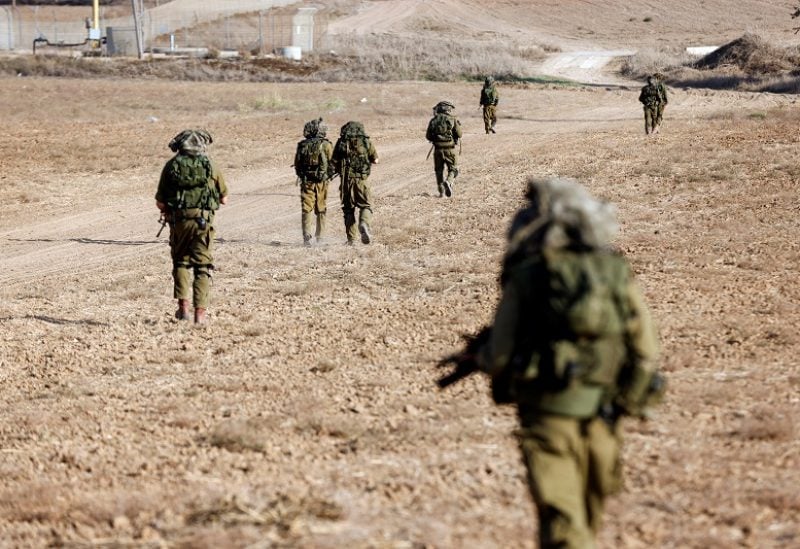
Israeli soldiers walk on grassy terrain near Israel's border with Gaza in southern Israel, October 12, 2023. REUTERS/Amir Cohen
Even in wars, there are laws, and there is a minimum level of respect for the adversary, despite the language of destruction and killing. However, Israel, which does not recognize international laws or the minimum standards of humanity, violates human rights every day.
How can the Israeli army request hospitals to evacuate? By what right does this mean evacuating a hospital with its patients, wounded, and the piled bodies resulting from the war on Gaza?
How can the Israeli army ask landowners to evacuate and leave, along with their roots, memories, and properties, leaving behind everything they own?
Even the sanctity of death has been violated by Israel, as it pursued the dead to their graves, placing bodies inside ice cream freezers. What religion or moral code accepts such an indignity towards the deceased?
Israel left no place for the dead, and it left the living with no shelter, no life, no water, no food. It did not allow the children of Gaza to live their childhood.
Everyone is calling on Israel to respect international law, what is it?
International humanitarian law is a set of rules aimed at minimizing the humanitarian effects of armed conflicts for humanitarian reasons. This law protects individuals who do not directly or effectively participate in hostile actions or who have refrained from direct or effective participation. It also imposes restrictions on the means and methods of warfare. International humanitarian law is also known as “the law of war” or “the law of armed conflicts.”
International humanitarian law is a branch of public international law, primarily consisting of treaties and customary international law, in addition to general principles of law (see Article 38 of the Statute of the International Court of Justice).
It is important to distinguish between international humanitarian law, which governs the behavior of parties involved in armed conflicts (jus in bello), and public international law, which is enshrined in the United Nations Charter and regulates the legality of a state’s use of armed force against another state (jus ad bellum). The Charter prohibits the use of force but includes two exceptions: self-defense against an armed attack and when the UN Security Council authorizes the use of armed force. International humanitarian law does not concern itself with the justifiability of the outbreak of a conflict but rather seeks to regulate the behavior of the parties to the conflict once it has erupted.
Israel has waged several wars against Gaza and Lebanon over the past twenty years, during which it has used internationally prohibited weapons taken from its stockpiles to bombard the homes of civilians and isolated areas.
White Phosphorus Bombs
These weapons vary and have different names, but white phosphorus bombs are among the most prominent. These bombs consist of a toxic, waxy substance that rapidly reacts with oxygen, causing second and third-degree burns.
This substance is easily absorbed through the skin into the rest of the body and can cause other serious symptoms, even leading to death due to the damage it inflicts on the kidneys, liver, and heart.
Dense Inert Metal Explosives (DIME)
The people of Gaza are familiar with another prohibited weapon known as “Dense Inert Metal Explosives” (DIME), which has been used against the territory in the past.
These explosives create a small but highly destructive blast radius. They are manufactured by mixing explosive material with small chemical particles.
The explosion of this type of bomb tears human tissue and causes untreatable injuries due to the chemical substances involved.
Destructive Cluster Bombs
As for the third type of these bombs, they are destructive cluster bombs. Each one of these contains dozens of sub-munitions and leaves behind thousands of fragments upon explosion. These were developed by the Israeli company “Elbit.” Tel Aviv has refused to join the treaty banning their proliferation.
Vacuum Bombs are among the most lethal weapons. They are fuel-air bombs that consist of a container with two separate explosive charges. When they explode, the first charge opens the container and scatters a fuel-air mixture over a wide area. Then, the second charge detonates, causing a massive explosion and creating a vacuum that consumes all the surrounding oxygen, leading to the near-complete destruction of buildings and equipment.